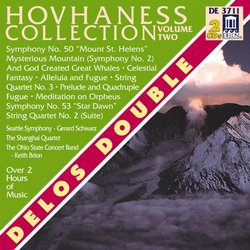| All Artists: Alan Hovhaness, Gerard Schwarz, Keith Brion, Seattle Symphony Orchestra Title: Hovhaness Collection, Vol. 2 Members Wishing: 1 Total Copies: 0 Label: Delos Records Release Date: 8/3/1999 Genre: Classical Styles: Chamber Music, Historical Periods, Modern, 20th, & 21st Century, Symphonies Number of Discs: 2 SwapaCD Credits: 2 UPCs: 013491371122, 001349137112 |
Search - Alan Hovhaness, Gerard Schwarz, Keith Brion :: Hovhaness Collection, Vol. 2
 | Alan Hovhaness, Gerard Schwarz, Keith Brion Hovhaness Collection, Vol. 2 Genre: Classical |
Larger Image |
CD DetailsSimilar CDs
|
CD ReviewsJust a bit worse than the first volume Joshua Kaufman | Cincinnati, OH | 01/07/2003 (4 out of 5 stars) "Alan Hovhaness's music tends to not be very memorable, however it IS highly emotional and I can never say it's inherently bad. This compilation contains his most popular piece, Symphony #2 "Mysterious Mountian", as well as many other pieces, most of which is the only recording. Beyond Mysterious Mountain, which gets a pretty good performance here, the highlight is easily Sympohny #50 "Mount St. Helens". This work portrays the eruption in 1980 that Hovhanes actually was close enough to to experiance its backlash. The first two movements are typical laid back Hovhanness, very pretty. The third movement, however, just ROARS with exceitment, and just does not stop. Wonderful. Amoung the other selections, 'And God Created Great Whales' is a very interesting piece that includes tape music of whales, and is somewhat aleatoric in nature (chance music). Prelude and Quadruple Fugue is very nice example of an orchestral fugue, while Alleluia and Fugue goes more toward the choral direction and is very pretty. As this is at twofer pricing, it's a very good buy, unless you already have some of the CDs these recordings were taken from. However, make sure to also get the other volume." An almost ideal and surprisingly variegated introduction to G.D. | Norway | 07/17/2009 (4 out of 5 stars) "In one sense this set, compiled from several earlier Delos releases, is the ideal introduction to Hovhaness's enormous oeuvre, featuring a collection of works of surprising diversity and variation. Hovhaness's strongly modal idiom might, in one sense, sound conservative, yet his voice is usually unmistakable (in that sense he resembles other 20th century composers with huge, always recognizable, outputs such as Milhaud and Martinu). The downside of this set is that the performances aren't always among the best ones around (although the quality varies a lot - for some works the performances are spectacular). One case in point is the second symphony - possibly Hovhaness's single most popular work (and one of the best), with its highly individual, inventive use of material in a way suggesting an enchanting mix of Sibelius and Vaughan Williams's Tallis Fantasia - the central fugue being particularly captivating. But listen to, say, the performance by John Williams (of all people), and the Seattle Symphony Orchestra under Gerard Schwarz sounds flat and dull by comparison and, most noticeably, poorly balanced with many details and figures just being buried under the string onslaught.
Despite its status as the second of approximately sixty-five symphonies, the second symphony is not an early work, being written by the composer when he was in his mid-forties. The Celestial Fantasy, on the other hand, was written in 1935, when the composer was 24, although orchestrated later. This interesting but somewhat wayward work is far more than most of the other orchestral works on the disc based on Armenian melodies, a touch which is also slightly hinted at in another relatively early work, the (otherwise much more typical) Prelude and Quadruple Fugue which sounds, despite the difficult format, surprisingly easy-flowing and amiable. Musically, however, we encounter a disappointment with another one of Hovhaness's more famous scores, And God Created Great Whales, from 1970. It begins with some aleatoric-sounding chirruping, followed by an almost impressively banal melody. Then, of course, the tacky, gimmicky element - the pre-taped sounds of whales - enters in for a while, interrupted by an instrumental crescendo and climax, followed by more whales etc. The whole creation is almost unbelievably embarrassing, in a slightly Taveneresque way; pretentious, drab, utterly self-conscious, boring and stupid. On the other hand, I cannot imagine a better performance than this one, and the sound quality is superb - the climax mentioned actually makes an impact, the first time around, in spite of the poor musical material. The first movements of his 50th symphony, Mount St. Helens is lyrical and the thematic material is distinguished - especially the Sibelian, slightly mysterious second movement. After a gentle opening, the last movement erupts with primal (almost Jon Leifs-like) power, pounding onwards with spectacular force before developing into a haunting, almost rhapsodic section with effective use of trombone glissandi. This is, in short, one of Hovhaness's strongest scores - not only because of the spectacle, but the consistent inventiveness and memorable, interestingly developed themes. It also receives a committed performance in sumptuous sound. Among the more interesting works here are the second (in excerpts) and third string quartets; the second consists of seven succinct movements of which three are given here, including an affecting Hymn movement; and the third is based on reminiscences from the composer's Armenian roots, slightly introspective but hauntingly lyrical. In short, these two mesmerizing works must rank among the real highlights of Hovhaness's output (or at least the small part of it I am familiar with). The somewhat popular Alleluia and Fugue, however, is bland and unimaginative; it is stylistically typical of the composer, but the idiom is better expressed elsewhere. The Meditation on Orpheus, on the other hand, is another highlight; an abstract lament, cogently structured (if without any classical development) and consistently engaging and thematically distinguished. The late symphony Star Dawn draws on the composer's interest in astronomy and Dante's Divine Comedy; it is another typical creation, scored for band in a manner almost like a choral work with some surprising touches of jazz-like textures - an amiable work, intermittently engaging, but which pales in comparison with the other two symphonies in the set. Overall, then, this is an almost ideal, surprisingly variegated survey of the composer's stylistic range - wider than one might suspect - and although not all performances are first rate, some certainly are, and all in all this release deserves a firm recommendation." |




